|
|
|
Sort Order |
|
|
|
Items / Page
|
|
|
|
|
|
|
| Srl | Item |
| 1 |
ID:
126736
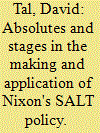

|
|
|
|
|
| Publication |
2013.
|
| Summary/Abstract |
President Richard Nixon and his National Security Adviser, Henry Kissinger took great pride in their success to achieve agreements on the limitation of Anti Ballistic Missiles and the Interim Agreement on Strategic Missiles with the Soviet Union. For Nixon, this agreement was not only an achievement that had been denied to his predecessor, it also seemingly represented the success of his own approach over that of his predecessors. Nixon-in tandem with Kissinger-intended to link arms control negotiations with the Soviet Union to the resolution of other political problems such as Vietnam, the Mideast, and Berlin. Through the employment of linkage, they hoped to make U.S. arms control policy part of Détente. However, Nixon was able to sign the "historic agreements" because his policy of linkage had in fact failed. It failed mainly because it was based on flawed assumptions and false premises. Thus, the historic success was possible precisely because Nixon had not actually made his arms control policy "distinct" from that of the Johnson Administration and its predecessors in his approach to strategic arms talks with the Soviet Union
|
|
|
|
|
|
|
|
|
|
|
|
|
|
|
|
| 2 |
ID:
126802
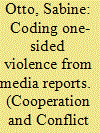

|
|
|
|
|
| Publication |
2013.
|
| Summary/Abstract |
Event datasets on political violence, which are comprised of coded collected news reports, have enjoyed a renaissance within the academic community. The inclusion of civilian fatalities within these datasets is a promising and welcomed advancement regarding the availability of data on one-sided violence. However, these datasets are often criticised due to their heavy reliance on media records, which may be tainted by biases. So far, little attention has been paid to the specific problems that arise in the coding procedure with respect to one-sided violence. This article addresses such difficulties by discussing particular challenges presented by media biases and by providing empirical evidence from coding one-sided violence. Furthermore, solutions and strategies are offered to the issues that could affect the coding process, including increased transparency, definition-adaptation, and the use of appropriate statistical models.
|
|
|
|
|
|
|
|
|
|
|
|
|
|
|
|
| 3 |
ID:
128097


|
|
|
|
|
| Publication |
2012.
|
| Summary/Abstract |
Russia's announcement that it does not want to renew the co-operative threat reducing programme with the United States has raised questions about the bilateral relationship. Richard Weitz investigates what it means for future agreements.
|
|
|
|
|
|
|
|
|
|
|
|
|
|
|
|
| 4 |
ID:
126661
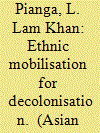

|
|
|
|
|
| Publication |
2013.
|
| Summary/Abstract |
This article attempts to communicate the methodological tension between subjectivity and objectivity by recording the aspiration of communities who are problematised both by colonialism and the modern nation-state. It highlights how colonial policy and practice contribute to the postcolonial imbroglio in Northeast India. It delineates how British colonial cartography always gave priority to 'administrative convenience' in the demarcation of boundaries, resulting in the division of ethnic community. It argues that Northeast India and the Indo-Burma borderland are not yet decolonised, as the government of India, without any rearrangement or alteration, adopts the colonial administrative boundaries, which divided ethnic communities. Neither the State Reorganisation Act (1956) nor the North-Eastern Areas (Reorganisation) Act (1971) fulfilled the aspiration of the segmented communities in the northeast, as they did in the mainland. The article also argues that the responses of the government of India towards the problems in Northeast India react to the manifested symptoms of the deep-rooted political problem rather than getting to the crux of the problem to find a solution.
|
|
|
|
|
|
|
|
|
|
|
|
|
|
|
|
| 5 |
ID:
130587
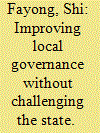

|
|
|
|
|
| Publication |
2014.
|
| Summary/Abstract |
The first decade of the new century had seen an increase in rights-protection protests in urban China. The main participants of these protests were local middle-class residents who initiated protests to raise issues on specific economic and social problems as opposed to abstract sociopolitical issues. They have started to claim rights which were granted to citizens by law in principle but never actually delivered. The sociopolitical changes facilitate the emergence and success of middle-class protests, which in turn have contributed to the improvement of local governance and positively reshaped local politics. However, their influence on the macro political structure of China remains to be seen.
|
|
|
|
|
|
|
|
|
|
|
|
|
|
|
|
| 6 |
ID:
133584
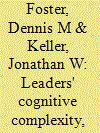

|
|
|
|
|
| Publication |
2014.
|
| Summary/Abstract |
Some scholars have suggested that when faced with domestic political problems, leaders employ simplified decision processes, preferring action to deliberation and highly visible diversionary uses of force to alternative policies. Others contend that domestically embattled leaders will pursue a more rational examination of the costs and benefits of various options-the sort of deliberation that will lead them to reject diversionary force in favor of less risky measures. Drawing on research in political psychology, we argue that leaders' cognitive processes are not constants but variables, and that both models are correct under certain circumstances. Leaders low in conceptual complexity (CC), and especially those with hawkish leanings, will pursue simplified decision-making procedures and embrace diversionary strategies, while leaders who are high in complexity will pursue a more thorough consideration of risks and alternatives and generally avoid diversionary actions. We examine these expectations by testing the interactive effect of economic misery and leaders' CC on American force usage for the period 1953-2000. The findings indicate that more conceptually simple leaders-particularly when high in distrust, a trait linked to more hawkish policy inclinations-are significantly more likely to engage in diversion.
|
|
|
|
|
|
|
|
|
|
|
|
|
|
|
|
| 7 |
ID:
133583
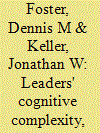

|
|
|
|
|
| Summary/Abstract |
Some scholars have suggested that when faced with domestic political problems, leaders employ simplified decision processes, preferring action to deliberation and highly visible diversionary uses of force to alternative policies. Others contend that domestically embattled leaders will pursue a more rational examination of the costs and benefits of various options-the sort of deliberation that will lead them to reject diversionary force in favor of less risky measures. Drawing on research in political psychology, we argue that leaders' cognitive processes are not constants but variables, and that both models are correct under certain circumstances. Leaders low in conceptual complexity (CC), and especially those with hawkish leanings, will pursue simplified decision-making procedures and embrace diversionary strategies, while leaders who are high in complexity will pursue a more thorough consideration of risks and alternatives and generally avoid diversionary actions. We examine these expectations by testing the interactive effect of economic misery and leaders' CC on American force usage for the period 1953-2000. The findings indicate that more conceptually simple leaders-particularly when high in distrust, a trait linked to more hawkish policy inclinations-are significantly more likely to engage in diversion.
|
|
|
|
|
|
|
|
|
|
|
|
|
|
|
|
| 8 |
ID:
116563
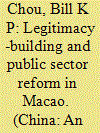

|
|
|
|
|
| Publication |
2012.
|
| Summary/Abstract |
Public sector reform has been an important strategy for the Macao government to build up its legitimacy since the handover of sovereignty. This article outlines the background of the legitimacy crisis that can be traced back to the administrative problems during the colonial era. Public sector reform in the post-handover era can be divided into two phases. Remarkable legitimacy-building was evident during the first phase of the reform that focused on the technicality of administrative efficiency and work performance. With a looming crisis of legitimacy in 2006, the Macao government continued to rely on the reform of the technical aspects of the administration by taking the approach of wider public consultation in the second phase of the reform. What have been left unreformed are the institutional shortcomings that hold back public participation and weaken the autonomy of public administration. The cause of the legitimacy crisis starting in the mid-2000s was the failure to introduce wider public involvement in public affairs and the maintaining of limited administrative autonomy. The path dependence of the second phase of the reform can hardly tackle the key factors of the new legitimacy crisis.
|
|
|
|
|
|
|
|
|
|
|
|
|
|
|
|
| 9 |
ID:
133537


|
|
|
|
|
| Publication |
2014.
|
| Summary/Abstract |
Anyone who cares about both the national security threat arising from transnational al Qaeda-inspired terrorism and the need to develop a measured, effective response to this threat owes a great deal of gratitude to Marc Sageman. He was an early teller of inconvenient truths. As he notes in his essay, the tumultuous years following 9/11 were marked by the rise and mass dissemination of wild, ahistorical, and anecdote-based theories about the causes and possible solutions to violence motivated by the virulent ideology propagated by Sayyid Qutb in the 1950s and tragically brought to our shores by Osama bin Laden. Sageman insisted, however, that theory must be supported by evidence. He presented the facts as he saw them without regard to those he was undercutting on each side of the political spectrum. Over a decade after 9/11, his work has withstood the test of time and had a significant positive impact on our understanding of why al Qaeda attacked us and our policies for confronting this threat.
|
|
|
|
|
|
|
|
|
|
|
|
|
|
|
|
| 10 |
ID:
131652
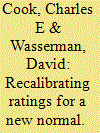

|
|
|
| 11 |
ID:
133539


|
|
|
|
|
| Publication |
2014.
|
| Summary/Abstract |
Dr. Sageman makes a good point that despite the influx of government funding in the last decade, terrorism scholars have not been able to answer what he calls a "simple question"-what leads a person to turn to political violence? But Dr. Sageman's conclusion that scholars' inability to answer this question is evidence of stagnation in the field is incorrect. First, most scholars who study terrorism are addressing risk factors for terrorism at the level of societies, not individuals, so it is hardly surprising that there is no "consensus answer" to Dr. Sageman's question. Second, the question Dr. Sageman poses about individual level decision-making is not at all simple to assess. It is difficult to make gross generalizations about what leads individuals to do what they do in any area of life; difficulty in answering this question is not unique to terrorism experts. Consider analogous questions about individual decision-making with regard to other life choices. Despite significantly more than a decade of study, neither scientists nor humanists have been able to explain, ex ante, what leads a person to fall in love, to murder another, or to choose a particular career path (as a terrorist, or otherwise). A detailed study of an individual's life history might enable scholars to propose ex post hypotheses as to why that individual chose a career as a terrorism expert rather than as a terrorist, but even then, experts from varying disciplines (including psychiatry) would focus on different parts of the problem, seen through different lenses. It is not clear why Dr. Sageman holds terrorism scholarship to a standard that no other group of scholars aiming to understand and predict human behavior has yet been able to achieve.
|
|
|
|
|
|
|
|
|
|
|
|
|
|
|
|
| 12 |
ID:
133538


|
|
|
|
|
| Publication |
2014.
|
| Summary/Abstract |
It is a pleasure to have this opportunity to respond to a distinguished colleague's concerns about the progress of terrorism research since the 9/11 attacks. Marc Sageman sees little progress and identifies numerous impediments to research, notably including lack of good data and over-reliance on formal modeling
|
|
|
|
|
|
|
|
|
|
|
|
|
|
|
|
| 13 |
ID:
138401
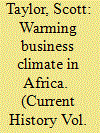

|
|
|
|
|
| Summary/Abstract |
According to a variety of metrics, business is booming in sub-Saharan Africa. Foreign direct investment (FDI) has increased steadily, from a mere $2.8 billion in 1990 to $57 billion in 2013. Programs that extol both the household and economy-wide benefits of entrepreneurship have proliferated, and a new generation of African business magnates serves as role models for citizens and government officials on a continent that once saw business as anathema to national development priorities. This new capitalist ethos corresponds with other striking achievements. Gross domestic product rose by over 5 percent annually between 2000 and 2014, and growth is forecast to remain in the range of 4-5 percent for the next several years.
|
|
|
|
|
|
|
|
|
|
|
|
|
|
|
|
|
|
|
|
|